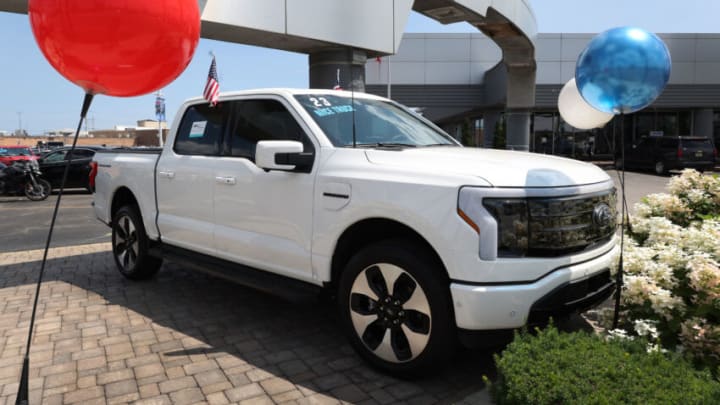I am not a truck guy. So please, if you are a truck person, don’t eat me alive for this. I’m but a simple person from Britain who eats beans on toast and will occasionally enjoy a cup of tea. I haven’t ever really been brought up around the sort of truck culture America has, with the American big 3 (Ford, Chevy, GM). Although my dad did own a Mitsubishi L200 Animal, which I loved, but was too young to care much about what diesel engine it had.

So why, uncultured man do you think the Ford F150 Lightning makes sense?
I’m of the Jeremy Clarkson school of thought, and personally, I’ve never enjoyed the sound of a diesel engine, even a muscular one that sounds like it’s wor-
-king really hard, and like it wants to do cool stuff off road. My mum had a diesel A Class for more than enough years, and it’s fair to say if you closed your eyes, you’d think a van was idling next to you.
With that said, that’s the first reason I think the F150 Lightning makes sense. Yes, I know there are petrol (gasoline) options for the F150, however, I imagine most sensible people would opt for the Diesel V6, and they do. The F150 XLT, with the 3.0 V6 diesel, is the best selling trim level, and that makes sense given a large number of these probably use their F150 for work purposes, and a torque focussed diesel makes sense, economy wise too.
That’s a lot of noisy diesel F150s on the road, and for anyone (like me) who isn’t a fan of the sounds that commercial and farm machinery make, having less on the road is a win-win situation, so that’s the first reason the F150 Lightning makes sense. I’m not saying ALL F150s should be replaced by electric power, by the way. I’m a huge fan of V8s, as most

car fans are, and I think the highest trim level, shouty V8 F150s are very cool sometimes.
Secondly, it just makes sense. Diesel engines generally tend to be more economical than their petrol counterparts. But you know what’s even cheaper and more economical than diesel? Well, right now, it’s electric power, and the current ‘Lightning’ trim level of the F150 has a range of around 300 miles, which is good. However, if you’re in the market for a truck like the F150, you’ll probably want to tow or carry things. This will hurt your range. More on that later.
A third reason Ford’s F150 Lightning makes sense is that with its dual electric motors, it’s much more torquey than any of the other trim levels. The Lightning produces an insane 775 lb.-ft of torque and 563 horsepower. Oh yeah, the torque is delivered instantly, as per electric motors. It also comes with all-wheel drive as standard and has 8.9 inches of ground clearance.
This means that the Lightning is lightning fast, getting to 60 miles per hour in close to 4 seconds (a soulless and emotionless 4 seconds, but 4 seconds nonetheless). I know that 0-60 doesn’t matter in a truck, but here’s something that does. The F150 Lightning is really good off-road. The massive torque numbers and ground clearance will get you out of almost any trouble. Also, underneath, you’ll find a large skid plate to stop damage from rocks and other rough terrain. I don’t know why the Lightning wasn’t marketed as more of a rugged off-roader, as Ford also gave it a mechanical rear locking diff ( as on other trim levels), but still, it’s a good car on and off-road. However…
Here’s why the Ford F150 Lightning doesn’t make sense
Like with every EV, the Lightning has its faults, and they’re not small ones either. Remember earlier when I said more on that later about the F150 Lightning’s range when towing or carrying heavy loads? Yeah about that. As stated earlier, the Lightning’s range is 300 miles, which sets the vegetarian F150 at an immediate disadvantage, as its range is 200 miles less than its petrol brothers.
Now, knowing this, according to Digital Trends, when towing just over 3000 pounds (1360kgs), your range could be brought down to as few as 115 miles. Yes, obviously, it’s the same story in the petrol and diesel variants, but just less so. This is not good for the ever-present range anxiety of an EV driver, so you better not tow heavy loads in the vehicle you bought for its rugged and utilitarian performance. It’s just a fast, weak vehicle, much like most other EVs.
The second issue is the price. If you’re an everyday person who wants something economical and that’s a good work vehicle, you won’t be looking for an F150 Lightning, not for price, at least. The most basic Lightning starts at around $50,000-$55,000 ( 40,640-£44,700), which is a lot. Yes, it looks good inside, and it’s quick. But that isn’t enough to charge that much money for. For comparison, you can get a diesel V6-powered XLT trim level for around $29,000 (£23,571). With less range and poor towing, what are you paying over $20,000 extra for? I can’t say I’m too sure.
So… What’s the verdict?
I stand by the headline. The Ford F150 Lightning makes a lot of sense, and I’m glad it exists. However, the first generation was always going to be awkward and have its teething issues, so I hope Ford doesn’t give up. If the issues with range, towing capacity, and price can be addressed, I genuinely think the Lightning will have a place as a solid work truck. However, I don’t believe this is the case yet.
